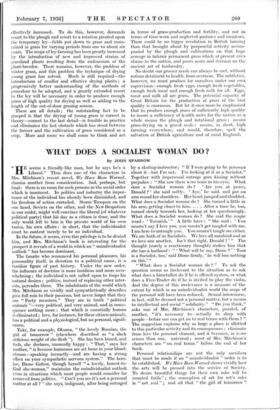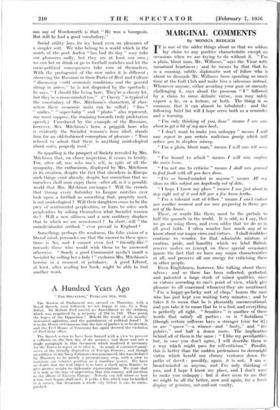WHAT DOES A SOCIALIST WOMAN DO ?
By JOHN SPARROW
In the future, it seems, even this privilege is to be denied him, and Mrs. Mitchison's book is interesting for the prospect it reveals of a world in which an " unindividualist outlook " has become dominant.
The fanatic who renounced his personal pleasures, his personality itself, in devotion to a political cause, is a familiar figure of past history. Under the new order, the influence of doctrine is more insidious and more over- whelming ; the individual is not called upon to forgo his natural desires ; politics, instead of replacing other inter- ests, pervades them. The inhabitants of the world which Mrs. Mitchison so vividly and sympathetically describes give full rein to their passions, but never forget that they are " Party members." They are in truth " political animals "—very political, and very animal, and in conse- quence nothing more : that which is essentially human is eliminated ; love, for instance, for these citizen-animals, has a political and a physiological, but no personal, signifi- cance.
Take, for example, Oksana, " the lovely Russian, the girl of tomorrow " (elsewhere described as " a slack delicious weight of she-flesh "). She has been kissed, and feels, she declares, unusually happy : " That," says her mother, " is because hormones are set loose in your blood- stream—speaking inexactly—and are having a strong effect on your sympathetic nervous system." The hero- ine, Dione Galton, though herself " a lovely, honest-to- God she-woman," maintains the unindividualist outlook even in situations which most people would consider far removed from politics. " Can't you see it's not a personal matter at all ? " she says, indignant, after being outraged by a skating-instructor; " If I were going to be personal about it—but I'm not. I'm looking at it as a Socialist." Together with impersonal outrage goes kissing without prejudice : " She saw there a ere tears in his eyes. What does a Socialist woman do ? Are you at peace, Donald ? ' she said softly. Aye,' he said, and put an arm round her shoulders. Her heart jumped and thudded. What does a Socialist woman do ? She turned a little in his arm, getting closer to him. . . . After a time he, too, turned slowly towards her, looking at her questioningly. What does a Socialist woman do ? She said the magic word : Tovarish.' " A little later : " She said : You mustn't say I love you, you mustn't get tangled with me. I am here to untangle you. You mustn't tangle me either. We are both of us Socialists. We love all mankind and so we love one another. Isn't that right, Donald ? ' " The thought (surely a reactionary thought) strikes him that she has a husband : " ' What will he say, Dione ? " Tom is a Socialist, too,' said Dione firmly, ' he will lose nothing on this.' " " What does a Socialist woman do ? " To ask the question seems as irrelevant to the situation as to ask what does a bimetallist do if he is offered oysters, or what does a Free-Trader do if he is invited to play the violin. And the degree of this irrelevance is a measure of the extent by which in an unindividualist world the scope of the personal will have been reduced. Sexual intercourse, in fact, will be deemed not a personal matter, but a means to intellectual and social " solidarity." " Do you think," asks one of Mrs. Mitchison's characters, puzzled, of another, "it's necessary to—actually to sleep with people—before one can get on to real terms with them ? " The suggestion explains why so large a place is allotted to this particular activity and its consequences : eliminate from love the personal clement, and it becomes, in n:ore senses than one, universal ; most of Mrs. Mitchison's characters are " on real terms " before the end of her book.
Personal relationships are not the only sacrifices that must be made if an " unindividualist " order is to be established. We Have Been Warned shows vividly how the arts will be pressed into the service of Society. To desire beautiful things for their own sake will be counted futile" ; the conception of art for art's sake is " not real " ; and all that " the girl of tomorrow ". can say of Wordsworth is that " He was a bourgeois. But still he had a good vocabulary."
Social utility lays its icy hand even on pleasures of a simpler sort. We who belong to a world which in the words of the poet Auden " has had its day " may take our pleasures sadly, but they are at -least our own we can bet or drink or go to football matches and let the socio-political consequences take care of themselves. With the protagonist of the new order it is • different ; observing the Russians in their Parks of Rest and Culture' " discussing -.7orld economic conditions and the general slump in prices," he is not disgusted by the spectacle ;. he says, " I should like living here. They're a cheery lot, but they're serious-minded too." (" Cheery " is typical of the vocabulary of Mrs. Mitchison's characters, if char- acters these economic units can be called ; " lino " " undies," " super-baby " and " photo " also represent, one must suppose, the straining towards truly proletarian speech.) Unseduced by the example of the Russians, however, Mrs. Mitchison's hero, a priggish bore Who is evidently the Socialist woman's beau ideal, stands firm for an old-fashioned conception of pleasure : " Tom refused to admit that there is anything unideological about cafes, properly used."
So appalling is the prospect of Society revealed by Mrs. Mitchison that, on closer inspection, it ceases to terrify. For, after all, one asks one's self, in spite of all the sympathy, the enthusiasm, displayed by Mrs. Mitchison in its creation, despite the fact that elsewhere in Europe such things exist already, despite her conviction that we ourselves shall soon enjoy them—after all, is it a possible world that Mrs. Mitchison envisages ? Will the crowds that throng every Saturday to League matches ever look upon a football as something that, properly used, is not unideological ? Will their daughters cease to be the prey of sentimental perplexities, or learn to solve such perplexities by asking themselves what Socialist women do ? Will a new silliness and a new snobbery displace that to which we are accustomed.? In short, will " the unindividualist outlook " ever prevail in England ?
Something, perhaps the weakness, the false vision of a liberal-mind, persuades me that the answer to these ques- tions is No, and -I cannot even feel " friendly-like " towards those who would wish them to be answered otherwise. " Surely a good Communist needn't insult a Socialist by calling her a lady ! " exclaims Mrs. Mitchison's heroine in a moment of petulance. A good Liberal, at least, after reading her book, might be able to find another word.















































 Previous page
Previous page